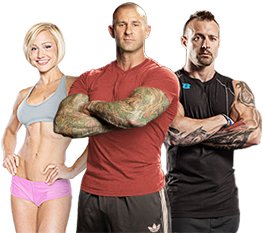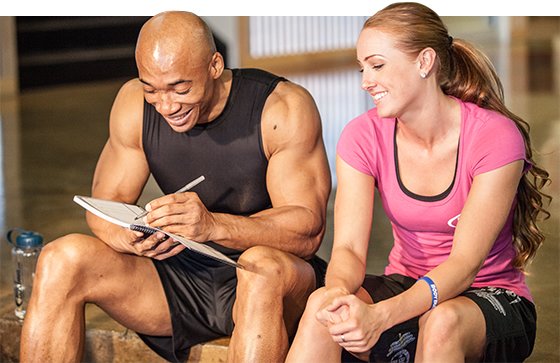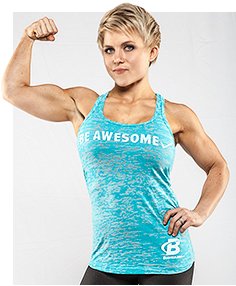Congratulations, you've made the decision to get fit. That's a big first step, and one you should be proud of. Your second step is to actually walk into a fitness center or gym. And if you're unsure of what to do, that can feel as intimidating as your first day of high school.
Many people in this situation hire a personal trainer to help them get started. A trainer can show you around the gym, teach you how to use the equipment, take you through workouts, and help you come up with achievable goals and strategies, sometimes with a little nutrition coaching mixed in. But personal trainers aren't reserved for beginners. Trainers can also help you prepare for a competition, a race, or just overcome a sticking point.
If you're going to invest time, money, and trust in a person to guide you in the right direction, then you need to make the right choice. Hitting up the nearest pretty boy or girl may not turn out so great if you find out their brains are all in their biceps!
Starting Your Search

Personal trainers can be found anywhere, which is both good and bad. The most common, and usually most convenient, point of contact is your local gym. Most gyms have an army of trainers ready to help. Especially during this time of year, most gyms will have promotions to help you to save money up front.
If you prefer to work out at home, look into hiring a private personal trainer. A simple Internet search for private trainers in your area will usually turn up some promising local candidates. Hiring a private trainer is a more expensive route, but it's often more convenient. However, if you go this way, make sure to ask if equipment will be provided.
Once you have a candidate in mind, use these five rules to determine if they're a fit for you. If not, don't be afraid to keep shopping until you find someone who is.
1
Be Certain About The Cert
One of the most important aspects of finding the right trainer is ensuring that he or she is actually qualified to do the job. It's all too easy for people to call themselves "trainers" when they have little or no expertise.

Good trainers have certifications from reputable organizations or degrees in the exercise or fitness field. Some of the most widely recognized associations and their certifications are the National Academy of Sports Medicine (NASM); National Strength and Conditioning Association (NSCA, which confers both CPT certifications and CSCS, or Certified Strength and Conditioning Specialist); the American Council on Exercise (ACE); and the Aerobics and Fitness Association of America (AFAA).
In addition to a nationally recognized certification, make sure that your trainer knows CPR and first aid. Don't be afraid to ask to see proof of certification. After all, you're putting your health in this person's care!
2
Know What Motivates You
Choose a trainer who will cater to your personal needs and learning preferences. While some people want to be pushed to their limits by a drill sergeant type, others are going to work better with positive reinforcement and gentle encouragement. Your trainer should fit your personality and motivation style.
You'll be spending a lot of important hours with this person, so your comfort and ease of communication are paramount. Don't be afraid to ask direct questions about coaching style and motivation techniques. It's much better to decline a trainer before you even start than to set yourself up with the wrong one.
3
Ask For Evidence
A trainer's competence is only as strong as the results they've been able to attain with their clients. As the saying goes, the proof is in the pudding—or the lack of pudding. Ask to see success stories or client referrals. Whether you are losing fat, adding muscle, or training for an athletic event, you want to see that your trainer has had success in this area.
Of course every trainer has to start somewhere, but how badly do you want to be someone's guinea pig when you're just getting started yourself? Your trainer should be able to provide you with the names and contact information of people who line up with you in terms of age, sex, and fitness goals. Talk to those people, and you'll quickly figure out if this is the trainer for you.

4
Define Special Conditions
If you have special needs, it's critical that you inform your prospective trainers and ask if they have experience working with them. Exercise can help relieve symptoms of many medical conditions, but bad choices can exacerbate an existing problem.

If you have a medical condition, check with a doctor before starting a personal training program. After being cleared, mention every medical condition to your trainer. Give yourself the best chance to succeed.
5
Take Your Time
You're putting your health and your future in another person's hands— that's a big deal! Take the time to shop around. You don't always buy the first sweater you see in the store; you take the time to try it on and make sure the price is right. The same should be true for your trainer.
If you want to find the perfect person to help you start your new life, then you're right to be picky. Making the right choice can mean the difference between achieving your goals and ending up as another failed-resolution statistic.

